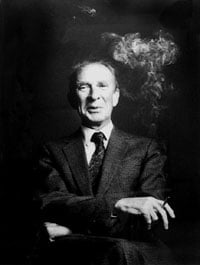Peter Frederick Strawson
Sir Peter Frederick Strawson (November 23 1919 – 13 February 2006) was an English philosopher. He was the Waynflete Professor of Metaphysical Philosophy at the University of Oxford (Magdalen College) from 1968 to 1987. Before that he was appointed as a college lecturer at University College, Oxford in 1947 and became a tutorial fellow the following year until 1968. On his retirement in 1987, he returned to the college and continued working there until shortly before his death. Strawson was a leading member of the group of philosophers who practiced was known as "Oxford philosophy" or "ordinary language philosophy."
Life and work
Born in Ealing, West London, Peter Strawson was brought up in Finchley, North London, by his parents, both of whom were teachers. He was educated at Christ's College, Finchley, followed by St John's College, Oxford, where he read Philosophy, Politics, and Economics.
Strawson first became well known with his article "On Referring" (1950), a criticism of Bertrand Russell's Theory of Descriptions (see also Definite descriptions). He was largely responsible for establishing metaphysics as a worthwhile direction in analytic philosophy.
In philosophical methodology, Strawson defended a method he called "connective analysis." A connective analysis of a given concept assumes that our concepts form a network, of which the concepts are the nodes. To give a connective analysis of a concept (say, knowledge) is to identify the concepts which are closest to that concept in the network. This kind of analysis has the advantage that a circular analysis (say, analysing knowledge into belief, belief into perception, and perception into knowledge) is not debarred, so long as it is sufficiently encompassing and informative.
Peter Strawson was made a Fellow of the British Academy in 1960, and Foreign Honorary Member of the American Academy of Arts and Sciences in 1971. He was president of the Aristotelian Society from 1969 to 1970. He was knighted in 1977, for services to philosophy.
His son, Galen Strawson, is also a philosopher.
Strawson died in hospital on 13 February 2006 after a short illness.
Partial bibliography
Books
- Introduction to Logical Theory. London: Methuen, 1952.
- Individuals: An Essay in Descriptive Metaphysics. London: Methuen, 1959.
- The Bounds of Sense: An Essay on Kant's Critique of Pure Reason. London: Methuen, 1966.
- Logico-Linguistic Papers. London: Methuen, 1971
- Freedom and Resentment and other Essays. London: Methuen, 1974
- Subject and Predicate in Logic and Grammar. London: Methuen, 1974
- Skepticism and Naturalism: Some Varieties. New York: Columbia University Press, 1985.
- Analysis and Metaphysics: An Introduction to Philosophy. Oxford: Oxford University Press, 1992.
- Entity and Identity. Oxford: Oxford University Press, 1997.
Articles
- "Truth" (Analysis, 1949)
- "Truth" (Proceedings of the Aristotelian Society suppl. vol. xxiv, 1950)
- "On Referring" (Mind, 1950)
- "In Defence of a Dogma" with H. P. Grice (Philosophical Review, 1956)
- "Logical Subjects and Physical Objects" (Philosophy and Phenomenological Research, 1957)
- "Singular Terms and Predication" (Journal of Philosophy, 1961)
- "Universals" (Midwest Studies in Philosophy, 1979)
ReferencesISBN links support NWE through referral fees
- The Philosophy of P. F. Strawson, Louis Hahn, ed. (Open Court, 1998)
- Theories of Truth, Richard Kirkham (MIT Press, 1992). (Chapter 10 contains a detailed discussion of Strawson's performative theory of truth.)
- Sir Peter Strawson (1919–2006), Univ Newsletter, Issue 23, page 4, Hilary 2006.
External links
- Freedom and resentment. Full text of his 1962 article.
- Obituary — The Times
- Obituary — The Guardian
- Peter F. Strawson: Analysis and Metaphysics. Roundtable on Strawson in Lima, Peru
Credits
New World Encyclopedia writers and editors rewrote and completed the Wikipedia article in accordance with New World Encyclopedia standards. This article abides by terms of the Creative Commons CC-by-sa 3.0 License (CC-by-sa), which may be used and disseminated with proper attribution. Credit is due under the terms of this license that can reference both the New World Encyclopedia contributors and the selfless volunteer contributors of the Wikimedia Foundation. To cite this article click here for a list of acceptable citing formats.The history of earlier contributions by wikipedians is accessible to researchers here:
The history of this article since it was imported to New World Encyclopedia:
Note: Some restrictions may apply to use of individual images which are separately licensed.
